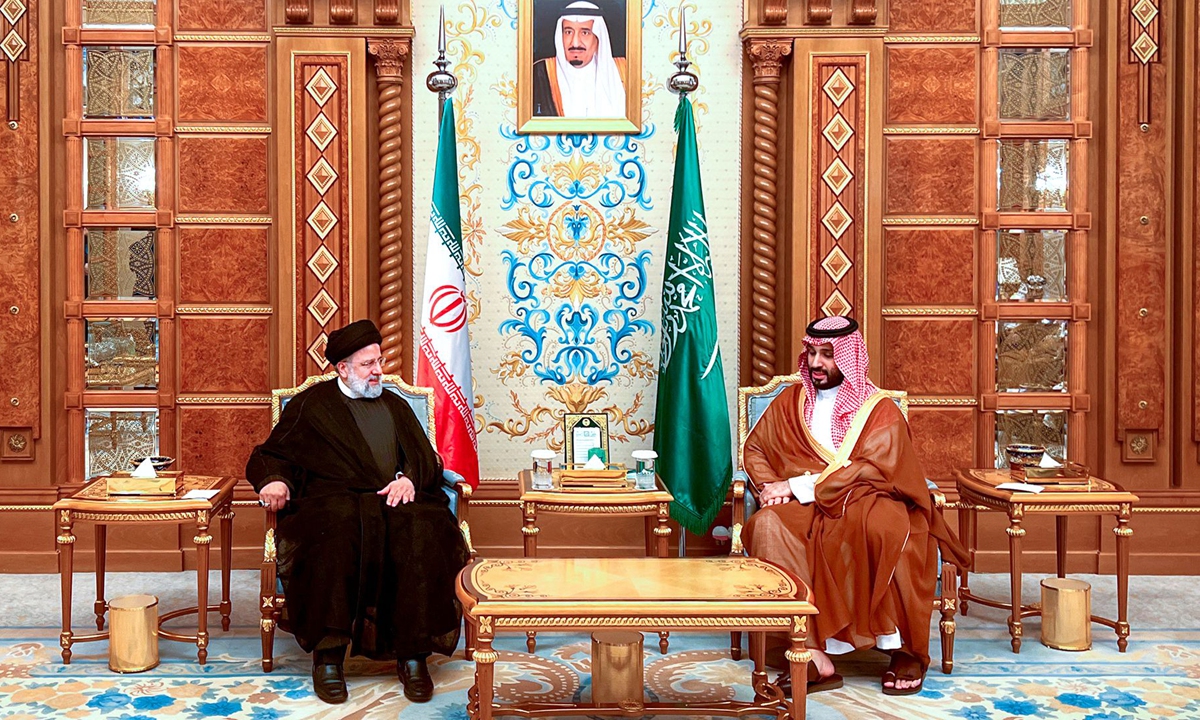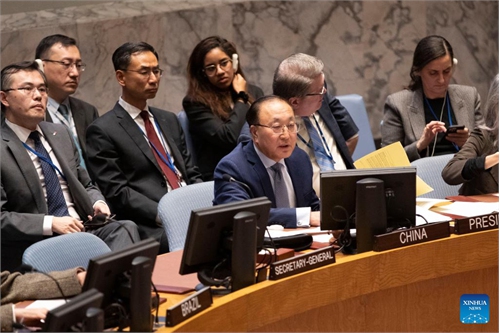Arab-Islamic world demands immediate end to Gaza attacks; mounting global pressure on Israel for cease-fire
Israel disrupts Biden's Middle East strategy, affecting reconciliation process with Saudi Arabia

This handout picture provided by the Iranian Presidency on November 11, 2023, shows Saudi Crown Prince Mohammed bin Salman (right) meeting with Iranian President Ebrahim Raisi during an emergency meeting of the Arab League and the Organisation of Islamic Cooperation, in Riyadh. The two countries announced the resumption of diplomatic ties on April 6, 2023, under China's mediation. Raisi's trip marks the first visit by an Iranian president to Saudi Arabia since 2012. Photo: VCG
As a significant result of the joint Islamic-Arab summit in Riyadh held on Saturday (local time), Saudi Arabia and other Muslim countries called for an immediate end to military operations in Gaza, rejecting Israel's justification of its actions against Palestinians as "self-defense." Chinese observers view the development as a historic moment when the Arab-Islamic world is moving toward unity while Israel is intensifying its attacks on the Gaza Strip.
According to a final communiqué, the Islamic-Arab summit urged the International Criminal Court to investigate "war crimes and crimes against humanity that Israel is committing" in the Palestinian territories.
Reuters reported on Sunday that at the meeting, Saudi Arabia sought to press the US and Israel for an end to hostilities in Gaza, and Saudi Crown Prince and Prime Minister Mohammed bin Salman Al Saud gathered Arab and Muslim leaders to reinforce that message as the month-long Israel-Palestine conflict has so far led to the deaths of over 11,000 Palestinians in Gaza.
Arab News reported on Sunday that the summit adopted a resolution saying "we seek to stop and end all Israeli illegal practices that perpetuate the occupation and deprive the Palestinian people of their right…"
Dozens of leaders including Iranian President Ebrahim Raisi, Turkish President Recep Tayyip Erdogan, Qatari Emir Sheikh Tamim bin Hamad Al Thani and Syrian President Bashar al-Assad, who was welcomed back into the Arab League this year, attended, Reuters reported.
The summit also saw Ebrahim Raisi's first visit to Saudi Arabia since Iran and Saudi Arabia agreed earlier this year to restore diplomatic ties under the mediation of China.
The Arab-Islamic summit has achieved significant results in jointly condemning Israel and demanding that Israel cease creating a humanitarian crisis in Gaza, Sun Degang, director of the Center for Middle Eastern Studies at Fudan University, told the Global Times on Sunday.
Sun said so far, part of the international community, especially the US-led Western camp, has not exerted significant pressure on Israel. Therefore, Israel continues its rampant attacks on Gaza. However, these attacks have brought the Arab-Islamic world together, which can boost pressure on Israel.
Li Weijian, vice president of the Chinese Association of Middle East Studies, told the Global Times on Sunday that although the summit could ramp up political pressure, its requests are largely symbolic and will not impose actual constraints on Israel.
Li believes that based on the current situation, it is unlikely there will be a comprehensive cease-fire and peace in the short term until both sides of the conflict engage in negotiations and reach a consensus. But if Israel continues to act unilaterally, it will undoubtedly have a greater impact on the future relationship between Arab countries and Israel.
He continued by saying that in recent years, Arab countries and Israel have been seeking developments in their ties, but since the eruption of the latest Israel-Palestine conflict, there could be a temporary suspension of these efforts.
Following the "Arab Spring" in 2010, the main contradiction in the Middle East region was the sectarian contradiction, Sun said. "However, since Israel's attack on the Gaza Strip, we believe that the main contradiction in the region has shifted to that between Israel and the Arab-Islamic world, which will pose a greater challenge to the improvement of relations between Israel and Arab countries."
In other words, according to some Chinese observers, Israel's military operations this time have disrupted US President Joe Biden' Middle East strategy, affecting the US president's hope for establishing Israel-Saudi Arabia relations.
They said that Biden is strategically pushing for Saudi-Israeli normalization as the centerpiece of his Middle East policy, but the outbreak of the latest Israel-Palestine conflict has disappointed Arab nations. Currently, Arab countries, including Saudi Arabia, refuse to align with the US and instead support the Palestinian people, calling for a cease-fire. This is a clear message to the US that Arab nations no longer want to be manipulated by the US.
In the meantime, Israel faces mounting pressure in the international community. Around 300,000 people turned out for a large pro-Palestinian rally in London on Saturday which coincided with annual Armistice Day commemorations. Organizers said the event could be one of the largest in British history.
Rallies were held in Barcelona, Paris, Ankara and many other places around the world on the same day to support Palestine and call for a cease-fire in Gaza.
It reflects that the US and Israel are facing increasing isolation in terms of public opinion, Sun said. As international attention continues to focus on the casualties among Palestinian civilians, the pressure will only grow. Consequently, Israel's military operations in Gaza are facing mounting moral and political costs, he noted.

